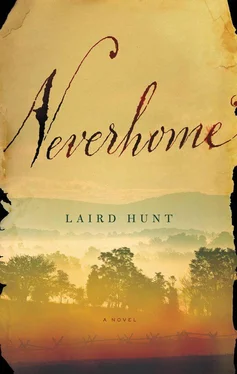“For all it is made of so many different designs, this china service is my miracle of constancy,” she said one day I was watching her. “There were soldiers in this house before I started to work for the hospital, every one of them ready to desecrate my sweet china. The captain with them who ordered it to stop before it had started knew my husband before the war. I served him tea out of this very pot.”
Still, many was the time after her long work she would come in, wash off her hands, see to my arm, then cry herself straight to sleep. She had kept canaries, a favored present from her husband, in a large white cage in the parlor, but whether she still had her grandaunt’s china or she didn’t, now the canaries and the husband were dead and buried and there were moments she could not bear even to hear a sparrow chirp.
She spoke of love and love brought to ruin by war. It did not trouble her to betray the cause her husband had fought and died for, she told me. The Confederate States had seceded out of stubbornness, and war had come and taken her husband away. She would move north when it was finished. Take her china and return to the village in Maine she had left all those years before.
“If they will have me,” she said.
“Why wouldn’t anyone ever have you?” I said.
“This war,” she said. “This war, this war.”
The flesh of my arm crept each day closer and closer together. Like two ragged companies didn’t know yet they were fighting for the same side. When I saw I could comfortably rest my left forearm on the table again, and hold myself to purpose, I asked Neva for paper to write on. She that evening brought me home a fine fresh stack. It was hard to look at the linen cream of that paper bought nice and neat from one of our Union sutlers specialized in officer wares and not think about the old soldier from Richmond. I thought, too, as I sat there and looked at that paper, because how could you ever not, about all my battles, about my days in the camp, my walk through the woods with the Akron boys, my talks with the Colonel, the soft hand on my face come from his beautiful cousin, my time caught tight beneath the tree. I wrote Bartholomew that I had stepped out of my uniform and lost my musket and his likeness — for I had left it in the mud by the creek — and now wore a dress again. My legs felt free and some of the rest of me did too. I had hurt my arm and feared to lose it but here it was holding down the fine paper I was writing to him on. I sat and talked with another woman, I wrote him, and it was good and easy to do so. I thought of my mother and it did not trouble me. “I feel I am sitting outside of it all and can breathe and look at it a minute and not choke on the dust in my mouth,” I wrote. I know I wrote this and that it was received. I have the letter sitting here beside me.
When I had finished writing, Neva brought me candle and sealing wax and, the next morning, carried my letter away with her. Sent it limping up to Indiana by the first post. The next morning after that, I tottered in from the garden to tell her my arm was no longer tight against my dress sleeve and found her in the kitchen wearing the rags of my uniform.
“Show me how you march,” she said.
“I don’t remember how to march,” I said.
She pouted a minute, worked at slicing cheese and snapping crackers. Then she stopped that and came to me, slowly with the first steps, then quickly with the last, then slowly she kissed me. I let her do this for a time. Her mouth tasted like linden berries of all things and I realized I couldn’t remember what Bartholomew’s mouth tasted like. It occurred to me that my own mouth must taste a little like the late pansy flower I had just been chewing on. We stood both of us, Neva and I, with our arms hanging at our sides and only our mouths pressed together. There was a moth in the kitchen. I could see it with my left eye. It sat waiting for night’s dark above the garden door. I moved my head a little to see it better, and Neva’s eyes came open. When they did I put my hand on her arm and pressed her away gently to make her stop. She stopped. She kissed me again the next day, nice and quiet this time and not in my old uniform, and again I let her and again after a time I had her stop.
The day after that second time, she made stewed oysters and corn fritters dressed in maple syrup and served it to us on her good china plate. This was the plate had on it monkeys climbing cherry trees. I had seen a monkey in a cage once in town. These monkeys looked bigger. Like if they wanted to they could tear down the trees. As we ate at our oysters they seemed to move. They would leap a little higher up their tree when I was lifting my fork but each time I tried to catch them at it they again slipped down. When we had finished our supper, Neva poured hot water into her pot and made us chamomile tea. We held cups favored handsome with golden lilies and blood-dark laurel leaves. She took my hand for a time, then she let it go. We leaned back in our chairs and she asked me if I wanted to hear a story, and though I feared a little she might reach for one of her fair volumes I said that I did.
The tale she told, which did not come out of one of her books, was about a cousin who had gone west from Maine to help shepherd some poor band of argonauts to California back in 1842. They had headed off west seeking gold from the ground or gold from the land or gold from the sea. Half Neva’s whole hometown had caught the settling fever for a while but only this cousin had actually gone, and not for any gold he thought he could have for the easy pickings but for the considerable riding fee. He had left off alone one early morning and Neva had stood with those who waved and watched. They had not seen him again for years.
The argonauts, which was the term he had used, even though they were no Greek explorers, just men and women bent on making it west, had done well for a while, the cousin had told it those years later upon his return, and then they hadn’t. The man had hired him rode off one day with some others to scout for water and didn’t come back. He was left with the man’s wife and two daughters. They had started out from Springfield, Illinois, with a hundred wagons in the train and little by little they worked it down to sixty-one. The train had split after the Wasatch, and the cousin had continued on with the woman and her daughters in a company much reduced.
When the Indians came it was in a fury and number that they hadn’t had enough muskets by half to answer. The woman’s two daughters were among those who were taken. The woman, said the cousin, had not waited even until dawn to set off after them. She had just grabbed a musket and walked off in her yellow dress and bonnet. The further diminished train, now just four or five wagons, had regrouped as best it had been able and continued on. Three days later at dusk the woman had walked into their camp with her daughters and three other children in tow. When pressed, she would not say how she had freed the children, only that it wasn’t any use to go after the others taken because they were all killed.
The argonauts made it to California and the woman and her daughters had gone to live with some of their people and that was the last the cousin had ever heard of them, though he had offered up that he hoped the woman had grown as rich as her courage. When Neva Thatcher had finished this story she brushed back a brown curl of hair, took a sip of her tea, and told me if I wanted she would give up on her project of going back home to Maine and that I could stay and live with her here. She had a wedge of land out in the countryside I could cultivate if I liked. It was bottomland, rich as rabbit stew. I did not answer, just sat still and looked at her, couldn’t find any word I could say would correspond to the story she had told about the woman who had gone off into the wild to get back what had been taken from her and what she was asking me.
Читать дальше












